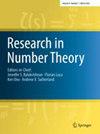An explicit upper bound for $$L(1,\chi )$$ when $$\chi $$ is quadratic
IF 0.8
Q3 MATHEMATICS
引用次数: 0
Abstract
Abstract We consider Dirichlet L -functions $$L(s, \chi )$$当$$\chi $$是二次元时,$$L(1,\chi )$$的显式上界
我们考虑Dirichlet L -函数$$L(s, \chi )$$ L (s, χ),其中$$\chi $$ χ是模q的非主二次特征。我们通过显示所有$$q\geqslant 2\cdot 10^{23}$$ q大于或等于2·10 23的$$|L(1, \chi )|\leqslant \frac{1}{2}\log q$$ | L (1, χ) |≤1 2 log q和所有$$q\geqslant 5\cdot 10^{50}$$ q大于或等于5·10 50的$$|L(1, \chi )|\leqslant \frac{9}{20}\log q$$ | L (1, χ) |≤9 20 log q来明确pinz和Stephens的结果。
本文章由计算机程序翻译,如有差异,请以英文原文为准。
求助全文
约1分钟内获得全文
求助全文
来源期刊

Research in Number Theory
MATHEMATICS-
CiteScore
0.80
自引率
12.50%
发文量
88
期刊介绍:
Research in Number Theory is an international, peer-reviewed Hybrid Journal covering the scope of the mathematical disciplines of Number Theory and Arithmetic Geometry. The Mission of the Journal is to publish high-quality original articles that make a significant contribution to these research areas. It will also publish shorter research communications (Letters) covering nascent research in some of the burgeoning areas of number theory research. This journal publishes the highest quality papers in all of the traditional areas of number theory research, and it actively seeks to publish seminal papers in the most emerging and interdisciplinary areas here as well. Research in Number Theory also publishes comprehensive reviews.
 求助内容:
求助内容: 应助结果提醒方式:
应助结果提醒方式:


